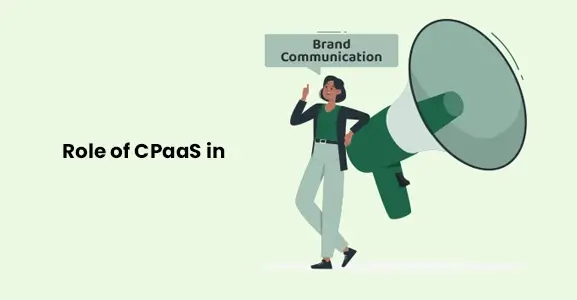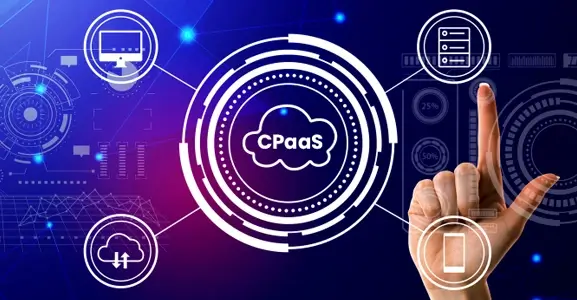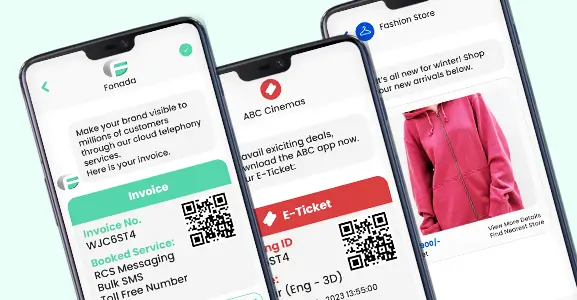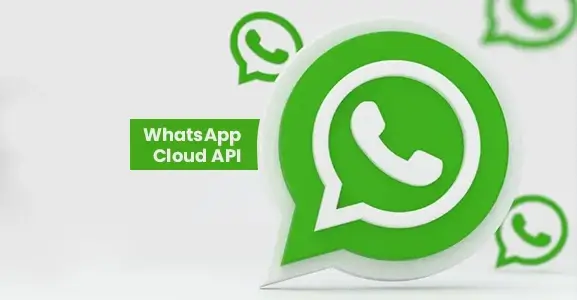Communications Platform as a Service (CPaaS) means a cloud-based solution that enables businesses to integrate voice, video, and messaging capabilities into their present software through APIs to build a real-time communications stack. This solution allows organizations to select real-time communication features and seamlessly integrate them into their applications and services.
What is CPaaS? CPaaS stands for abbreviation: Communications Platform as a Service. CPaaS is ideal for companies that already utilize cloud-based technology and desire to personalize their communication infrastructure. Despite its name, CPaaS is simply an API for voice and messaging. The “as-a-service” business model has become increasingly popular with the advancement of digital transformation.
It is important to note that CPaaS does come with a cost as these features must be custom coded, unlike a virtual phone system. However, the advantages offered by CPaaS are substantial.
Read more: Google Introduces “Bard” As A Rival To ChatGPT AI
What Is CPaaS? (CPaaS Full Form And CPaaS Meaning)
What is CPaaS full form? The full form of CPaaS is Communications Platform as a Service. It refers to cloud-based CPaaS solutions that allow businesses to incorporate real-time communication functionality into their own apps. With CPaaS, you have the flexibility to tailor your communication capabilities to your specific needs. Instead of acquiring a pre-packaged solution with predetermined features, you can integrate the communication channels of your choice with the software you already use.
Communication Platform as a Service (CPaaS), a cloud-based technology, offers businesses a unified solution for multi-channel communication, including real-time communication, in a secure and scalable infrastructure. CPaaS offers a range of communication tools driven by APIs to enable businesses to easily integrate these communication capabilities into their existing systems and processes. With CPaaS, companies can support their communication needs in real time and with increased scalability and security.
Traditionally, real-time communications (RTC) have been facilitated through dedicated applications such as the native phone app, Skype, FaceTime, WhatsApp, etc. These apps have been the norm for a long time as building and maintaining a complete communications stack, including the real-time network infrastructure and programming language interfaces, is a complex and costly endeavor.
It typically includes software tools, API’s compliant with industry standards, sample code, and pre-constructed applications. CPaaS providers also provide support and product documentation to assist developers throughout the development process. Some companies also offer SDKs and libraries for creating applications on various desktop and mobile platforms.
CPaaS Market And Statistics
Find interesting data on the CPaaS market and statistics.
CPaaS Statistics
A report from Fortune Business Insights, the worldwide market for Communication Platform-as-a-Service (CPaaS) is expected to experience a significant increase, growing from a valuation of $11.03 billion in 2022 to an estimated $62.54 billion by 2029, with a compounded annual growth rate (CAGR) of 28.1% during the forecast period.
According to a Statista report, the revenue generated by the global communications platform as a service (CPaaS) sector is estimated to reach 8.19 billion U.S. dollars in 2021. North America alone may contribute a significant portion of this revenue, accounting for nearly 4 billion U.S. dollars.
The CPaaS revenue comprises technologies like A2P SMS, RCS business messaging, OTT business messaging, push notifications, voice services, and API calls.
CPaaS Market
The CPaaS (Communications Platform as a Service) market comprises a diverse group of companies, including independent software vendors, service providers, systems integrators, and traditional equipment vendors, making it difficult to define. Nevertheless, experts anticipate substantial growth for the market, with projections of increasing from $400 million in 2015 to a staggering $8.1 billion in 2019.
There has been significant consolidation in recent years between UCaaS (Unified Communications as a Service) and CPaaS providers. Notable acquisitions and launches include:
- Genband’s launch of Kandy.io in 2014.
- OnSIP’s announcement of its CPaaS: OnSIP for Developers in 2014
- ShoreTel’s acquisition of Corvisa, Vonage’s acquisition of gUnify, Cisco’s acquisition of Tropo, and Avaya’s launch of Zang in 2015
- Telefonica’s acquisition of the chat platform, Tokbox in 2012
- Twilio, one of the original CPaaS providers, recently announced its plans to go public.
- Vonage announced the acquisition of Nexmo, a prominent player in the CPaaS space, in 2016.
Read more: Top Customer Service Tips To Deliver The Flawless Customer Experience
What Is A Cpaas Service Provider? (Cpaas Companies)
A CPaaS provider is a company or organization that provides tools for adding communication features to your system. These tools include APIs, small pieces of code, and ready-to-use applications. The APIs let you choose from different types of communication, like phone calls, text messages, group chats, and faxes. The provider will also give you instructions and support to help you use their tools. Companies like Twilio are always adding new APIs to their platform.
CPaaS providers or CPaaS companies come from different backgrounds and ways of doing business. Gartner categorizes these providers into five groups:
- Communication Service Providers: This includes companies like AT&T that have unique advantages, such as advanced network capabilities.
- Mobile App Software Providers: These include vendors such as IMImobile and CM.com.
- Pure-play vendors are well-established CPaaS providers that offer more than just simple voice and SMS APIs. They offer additional communication channels and have more complete tools for developers. Examples are Twilio, Vonage-Nexmo, Plivo, Sinch, MessageBird, and Infobip.
- SMS, A2P, And P2A Specialists: These vendors started as specialists in SMS and have now expanded into the CPaaS market. Their services are relatively new, either in the early stages or have recently combined multiple services. Examples are Soprano Design, TeleSign, Zenvia, and Kaleyra.
- Traditional Enterprise Communication Vendors: These vendors offer CPaaS products by integrating or adding to their existing communication solutions. Examples are Avaya, Alcatel-Lucent Enterprise, Plum Voice, Ytel, and IntelePeer.
How Does CPaaS Work?
CPaaS is a tool for developers to add real-time communication features to a company’s existing business software. It allows them to add things like live chat, voice or video calls, and text messages to the software instead of using separate communication apps like Microsoft Teams or Skype.
A third-party CPaaS service provides tools like APIs, sample code, and pre-made applications for the developers to use. This saves the company from building its own communication system from scratch.
CPaaS is a cloud-based service that is usually charged monthly for certain messages or minutes used. Some CPaaS providers offer a pay-as-you-go option as well. It’s a faster and cheaper way for companies to add communication features to their applications.
CPaaS is used in various industries like telehealth, education, customer service, field services, and more. The communication features it provides, such as video-enabled help desks and in-app messaging, can be used in different applications.
Read more: 10 Best IVR Service Providers In India
Use Cases And Examples Of CPaaS Apps
The CPaaS market is growing because more companies want to improve customer communications. They want to make sure their customers have a great experience, and CPaaS can help with that. For example, with CPaaS, companies can offer video chat help desks where customers can talk to a support agent with just one click. This way, the support agent can see what the customer is looking at and provide a more personalized experience.
Another way companies use CPaaS is for authentication. It means ensuring that only the right person can access sensitive information, like bank accounts or medical records. CPaaS can help ensure this information is safe from fraud and identity theft. CPaaS can help with many different types of communication for your business. Here are some unique ways you can use:
Appointments And Order Updates: CPaaS is excellent for sending messages about appointments, like reminders and confirmations, or updates about orders and deliveries. It can help reduce missed appointments and make customers happier by giving them all the necessary information.
Automated Customer Interactions: CPaaS can help you use chatbots and other automated customer engagement to answer customer questions in a self-service way. It is useful for industries with recurring customer questions, like e-commerce.
Fraud Protection: CPaaS can help keep your customers’ information safe by sending text messages for one-time passwords, two-factor authentication codes, and secure payment information. This works well for online accounts and payments businesses, like online shopping and banking.
Private Messaging: CPaaS can help you securely and privately send sensitive information to your customers, like credit card delivery notifications. It works well for businesses in industries like banking, healthcare, and insurance that handle sensitive information.
Voice And Messaging: CPaaS can help you add voice calls and messaging to your customer-facing applications, so customers can contact you quickly when they need to. It is highly helpful for travel and financial services industries, where customers need immediate assistance.
Communication Platform As A Service (Cpaas) Functions
CPaaS is a service that helps you improve your communication setup. It includes voice, SMS, fax, online meeting, team messaging, and analytics APIs that you can use to add features to your business software.
Inbound Call Routing: You can set up how incoming calls are handled using call routing. This is done through webhooks and can be customized to your needs.
Multimedia and Video Messaging: Some CPaaS providers offer multimedia and video messaging as part of their service.
Number Masking: Phone number masking allows you to connect two parties without revealing their phone numbers, which helps protect privacy and sensitive information.
On-Demand SIP Trunking: SIP trunking allows you to connect to your IP-based communication infrastructure. You can easily change your call capacity as needed.
Outbound Voice Calls: You can use the voice API to make outgoing calls. This is helpful when you need to change your calling capacity quickly.
Social Media Messaging (WhatsApp): You can use apps like WhatsApp for customer engagement. You can utilize it to send and receive multimedia messages and files, share locations, and automate customer support.
Text Messaging (SMS): You can add SMS communication to your software to send notifications, alerts, and more. You can also make it easy for customers to respond to you.
WebRTC-based Calling: Some CPaaS Providers offer a WebRTC solution, which allows you to add voice and video communication to your setup.
CPaaS Alternatives
When choosing a CPaaS vendor, you should consider the following factors.
API quality and variety. The quality, selection, and depth of APIs offered by the vendor should be a top priority. Choose a vendor that provides well-tested, reliable, and stable APIs, and also consider the programming languages supported by the APIs.
Ease of use for developers. Some CPaaS vendors offer modules and wrappers that cater to developers with limited coding experience.
Market experience. Younger, smaller CPaaS vendors may be at risk of going out of business or being acquired by a larger company, which could disrupt the service.
User and developer community. A strong user community for the platform can help developers make the most of its offerings.
Network infrastructure reliability. Choose a vendor that provides consistent and reliable service.
Data security. The vendor must be able to secure valuable data and should have strict security protocols in place for the platform and applications.
What Distinguishes UCaaS From Cpaas?
Both UCaaS (Unified Communications as a Service) and CPaaS are similar in providing businesses with advanced communication tools. But the way they deliver these tools is different. CPaaS is a set of APIs that allows businesses to add features like telephony and messaging to their existing software. You can turn your devices and apps into communication tools by choosing the specific APIs you need.
UCaaS, on the other hand, is a complete platform that provides a wide range of communication features, such as phone service, video meetings, usage reporting, and call recording. It’s like a ready-made painting.
So, to put it simply, CPaaS is like a blank canvas that you can customize to fit your needs, while UCaaS gives you a complete picture that you can start using immediately.
Read more: Learn Everything About Rich Communication Services
What Are The Benefits Of CPaaS For Businesses?
CPaaS platform offers app leaders a cloud-based, multilayered middleware for developing, running, and distributing communications software. This platform delivers integrated development environments and APIs to simplify the integration of communications capabilities into apps, services, and business processes. There are many benefits to using a CPaaS service:
- The company only pays for what they use.
- The company will save money on technology and maintenance.
- The CPaaS provider will offer support to help the developers, such as online guides, forums, and live help.
- The CPaaS service is hosted in the cloud to grow and change as needed.
- The developers can focus on building the software instead of worrying about the technology behind it.
- The existing business software does not need to be changed.
- The in-house developers can customize how the communication features work in the application to fit the company’s overall strategy. They also have control over the user experience.
- The service is secure and can be used by multiple customers at once.
- The software will be ready to use faster.
Cloud Communication Platform
CPaaS is a popular cloud communication platform (CPaaS) having a set of APIs that enables businesses and developers to integrate communication features like telephony, messaging, and video conferencing into their software apps. With CPaaS, businesses can turn their devices and apps into communication tools and allow their customers to communicate directly from the app or website. CPaaS will enable businesses to pick and choose specific APIs to add to their existing technology stack, providing more flexibility and customization than other communication solutions.
Other cloud communication platforms include Unified Communications as a Service (UCaaS), which provides businesses with a one-stop platform with built-in features such as phone service, video meetings, usage reporting, and call recording. UCaaS provides a single environment ready to be used out of the box.
In conclusion, cloud communication platforms offer businesses a way to enhance their communication and collaboration capabilities, increase customer engagement, and streamline operations.
Conclusion
CPaaS is a cloud-based technology (Communications Platform as a Service) that enables businesses to integrate communication features such as telephony, messaging, and video conferencing into their software applications. It is a cost-effective and flexible solution that helps companies to improve customer engagement, enhance security, and automate customer interactions.
By using CPaaS, businesses can streamline their communication processes and provide a seamless experience to their customers. The CPaaS market is growing with the increasing demand for contextual communication, and businesses of all sizes can benefit from its numerous advantages. Whether you are a startup or an enterprise, CPaaS is a valuable tool for improving your communication strategies and overall customer experience.
Fonada, one of the popular CPaaS companies, offers qualified cloud communication solutions to Indian companies for diverse industries.

Dec 11, 2024
Top Contact Center Optimization Tools For 2024
“A thriving business knows how to fetch maximum output from limited resources by optimizing ca... Read More
Nov 13, 2024
What Is Brand Communication? CPaaS Role Explained
Did you ever wonder why some advertisements grab your attention instantly, while others do not? The... Read More
Nov 01, 2024
What Is Automated Messaging And How Does It Work?
Automated messaging or text automation empowers businesses and marketing professionals to connect wi... Read MoreLatest Updates
From Fonada
Industry Insights, Trends, Innovations, Updates, and Case Studies from Industry Experts
View
Customer
Reviews
Discover why our customers love us - read their authentic and heartfelt reviews!
View
Case
Studies
Explore real-life scenarios, offering analysis, and solutions to practical challenges
View
Convert Leads Into Sales With Fonada
Trusted CPaaS Solution Provider








